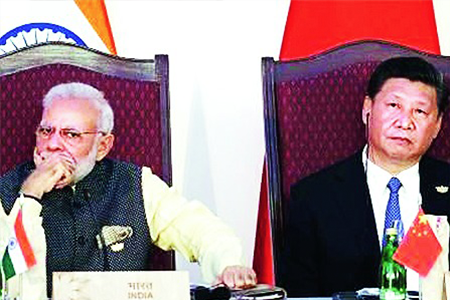 Facing up to a massive psychological war unleashed by China,with President Xi Jinping threatening to beat back any invader, India has decided that its army will settle for a long haul at Doklam and not blink anytime soon. The Chinese media, backed by the State, have unleashed a flurry of threats, ranging from a 'repeat of 1962 and worse' to 'India standing no chance in a conflict' and much more. Chinese columnists (fellows at Chinese think tanks) have written opinion pieces in Asian and Western media outlets, justifying the Chinese road construction at Doklam, strongly backing the claims that Doklam (or Donglang) was theirs, and projecting India as an aggressor. One Bhutanese columnist, reportedly close to a Delhi-based Chinese diplomat, has even asked India to leave Thimphu and Beijing alone to sort out their boundary differences and settle the Doklam stand-off, in effect suggesting that India should pull back its troops and not position them to confront China by invoking the 1949 treaty of friendship. Chinese writers have also focussed on the 1890 treaty between Sikkim and Tibet, saying that the boundary in this sector is settled, unlike in the west and the east, meaning Doklam is China's without doubt in spite of Bhutanese claims to the contrary. The Chinese offensive has been coordinated and multi-pronged, straddling diplomatic, military and media spaces, even as Beijing fumed with rage because its troops failed to push ahead with road construction through Doklam.
Facing up to a massive psychological war unleashed by China,with President Xi Jinping threatening to beat back any invader, India has decided that its army will settle for a long haul at Doklam and not blink anytime soon. The Chinese media, backed by the State, have unleashed a flurry of threats, ranging from a 'repeat of 1962 and worse' to 'India standing no chance in a conflict' and much more. Chinese columnists (fellows at Chinese think tanks) have written opinion pieces in Asian and Western media outlets, justifying the Chinese road construction at Doklam, strongly backing the claims that Doklam (or Donglang) was theirs, and projecting India as an aggressor. One Bhutanese columnist, reportedly close to a Delhi-based Chinese diplomat, has even asked India to leave Thimphu and Beijing alone to sort out their boundary differences and settle the Doklam stand-off, in effect suggesting that India should pull back its troops and not position them to confront China by invoking the 1949 treaty of friendship. Chinese writers have also focussed on the 1890 treaty between Sikkim and Tibet, saying that the boundary in this sector is settled, unlike in the west and the east, meaning Doklam is China's without doubt in spite of Bhutanese claims to the contrary. The Chinese offensive has been coordinated and multi-pronged, straddling diplomatic, military and media spaces, even as Beijing fumed with rage because its troops failed to push ahead with road construction through Doklam.
The Indian response appears muted but firm, effective where it matters - in the military sphere. The burly Indian soldiers managed to push back the Chinese soldiers physically, video-recording the episode meticulously for appropriate reporting upwards and media usage to counter the Chinese bullying. One Sikh havildar, with characteristic Punjabi humour, told this writer - "Sir , this was no war, but a solid kabaddi match." Having got the Chinese to stop the road construction into Bhutanese territory, the Indian troops have maintained utmost restraint with clear orders from the top not to open fire at any cost but also not to back off from Doklam under any circumstances.
Even though the details of the meeting between the national security adviser, Ajit Doval, and his Chinese counterpart, Yang Jiechi, are yet to appear in the public domain, it is known from reliable sources that the talks yielded no breakthrough. Yang stuck to the Chinese hardline position that Indian troops must first withdraw to pave the way for a 'meaningful dialogue', while Doval offered a mutual pull-out plan: let China stop the road construction and return to a pre-June 16 status quo and Indian troops will be pulled back simultaneously. Such mutual pull-outs have earlier brought down tensions at Depsang and Chumar in Ladakh in 2013-14, or elsewhere in the Arunachal sector. But this time, the Chinese are in no mood to relent. So this is a new challenge for Delhi. Having confronted the dragon, backing off now will have long-term consequences for India.
